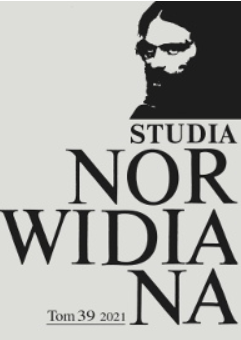Społeczność i historia, czyli pieniądz i krew Ekonomia w Vade-mecum Norwida
Society and history, or money and blood. Economy in Norwid’s Vade-Mecum
Author(s): Renata Gadamska-SerafinContributor(s): Grzegorz Czemiel (Translator)
Subject(s): Economic history, Polish Literature, 19th Century, Theory of Literature
Published by: Towarzystwo Naukowe KUL & Katolicki Uniwersytet Lubelski Jana Pawła II
Keywords: money in nineteenth-century literature; economy; capitalism; Cyprian Norwid; Vade-mecum;
Summary/Abstract: The subject of money occupies a prominent place in Vade-mecum, reflecting the significance of finance and economy in socio-political and philosophical theories of the nineteenth century. The question of “capital” emerges in many poems from the cycle, e.g. in “Socjalizm” [Socialism], “Larwa” [The Larva], “Stolica” [Capital City], “Prac-czoło” [The-Forehead-of- Labor]“Syberie” [Syberias], “(Co słychać?)” [How are you?] and “Nerwy” [Nerves]. Norwid’s opus magnumwas written in the period of intense changes in capitalist economy, notably in the wake of the global crisis following the American Civil War (1866), whose consequences are discussed by Marx in the first volume of Capital (1867). The famous publication by the German economist constitutes an important context for Norwid’s cycle, although the two are worlds apart in ideological terms. The poet was nevertheless greatly inspired by Proudhon’s works, which he read in the 1840s alongside other utopian socialists (possibly Owen), who would propose abandoning money in its traditional form as an antidote to economic crises and mass poverty. Additionally, Norwid’s letter dated 15 July 1867 (PW IX, 297) contains a trace of the poet’s reading of August Cieszkowski’s treatise Du Crédit, et de la Circulation (Paris 1839) and proof of contacts with the economist Ludwik Wołowski, co-founder and director of the Parisian bank Crédit Foncier de France (established in 1852). The above two men introduced some of the brilliant credit ideas developed by Prince Drucki-Lubecki to the France of Napoleon III . In Vade-mecum Norwid polemicizes both with utopian concepts of a socialist, moneyless economy and with Polish organicist ideas basing on profit economy and visions of economic success. Norwid recognized their departure from the Decalogue, the category of “conscience,” and Christian soteriology. In this sense, Vade-mecum becomes a Romantic and Christian attempt to return the question of money to its original context: that of ideals and spiritual life.
Journal: Studia Norwidiana
- Issue Year: 2021
- Issue No: 39
- Page Range: 249-291
- Page Count: 43
- Language: Polish

